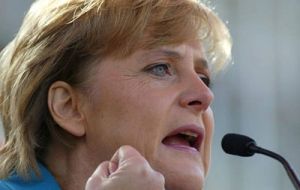MercoPress. South Atlantic News Agency
Euro-zone tightens budget rules; bail-out facility will buy bonds directly from governments
 German Chancellor Angela Merkel: “everyone had to make a contribution”
German Chancellor Angela Merkel: “everyone had to make a contribution” European leaders widened the scope of the Euro’s rescue fund, authorized it to buy government bonds and eased the terms of Greek bailout loans as they unexpectedly pushed through fresh measures to end the bloc’s debt crisis.
Under a pact struck at 1:30 a.m. Saturday in Brussels after eight hours of talks, the bailout facility will now be able to spend its full 440 billion Euro capacity and to buy bonds directly from governments. In a blow to European Central Bank President Jean-Claude Trichet, it won’t be allowed to purchase debt in the open market or to finance debt buybacks.
The agreement is part of a push by governments to draw a line under the crisis, which has raged for more than a year despite a series of remedies by European governments. Investors had expected a deal to be delayed until a March 24-25 summit, with the yields on Greek and Portuguese bonds this week rising to Euro-era records on concern officials would again fall short.
Allowing the fund to buy bonds in the primary market would help other indebted nations by acting as a backstop should a Greek restructuring spook markets and threaten to derail government bond auctions, he said.
While Greece was told it would have the cost of its loans pared and the repayment period extended, officials rejected Ireland’s bid for relief as recently elected Prime Minister Enda Kenny refused to yield to calls to raise its 12.5% company tax rate.
“This is an important message on the political pledge of the Euro members to fight for the Euro’s stability,” German Chancellor Angela Merkel told reporters. “Everyone had to make a contribution. I hope that this will also be a good message to the world in terms of the Euro as a major currency.”
An initial deal last night on a plan to tighten economic cooperation and boost competitiveness committed nations to enact budget rules into law, a core German demand, and paved the way for the final agreement by the end of the month.
By reaching an agreement now, Merkel avoided having to deal with it in the run up to a March 27 regional election in Baden Wurttemberg as her voters complain about having to bailout other countries.
In return for acceptance of her conditions on controlling debt, Merkel swung Europe’s biggest economy behind plans to allow greater flexibility and firepower in the EU rescue fund, the European Financial Stability Facility.
The EFSF had been limited to spending about 250 billion euros due to reserves it had to hold for its AAA rating. The commitment wasn’t matched with detail as Merkel indicated states will increase their guarantees.
The provision to allow primary-market bond purchases will offer a lifeline to aid recipients in return for austerity commitments. A basic accord was also reached on the permanent safety net from 2013, the European Stability Mechanism, with a mix of guarantees and capital, she said.
Adding urgency to the talks, the leaders met amid speculation that Greece would be forced to restructure its debt and Portugal would soon be the third euro nation to need help.
Leaders made a provisional agreement to lower Greece’s interest rates of about 5% for aid by 100 basis points, and extend the repayment period of the loans to 7 1/2 years from three years. Greek Prime Minister George Papandreou said the moves would save about 6 billion euros over the life of the loans.




Top Comments
Disclaimer & comment rules-

Read all comments“German Chancellor Angela Merkel: “everyone had to make a contribution” wow, and they said Angela is a chicken! She's got big balls, if she were a man she would be something like a bull, I mean, for the size lol
Mar 13th, 2011 - 10:56 pm 0Commenting for this story is now closed.
If you have a Facebook account, become a fan and comment on our Facebook Page!